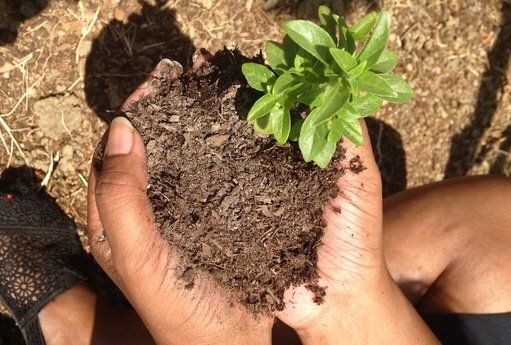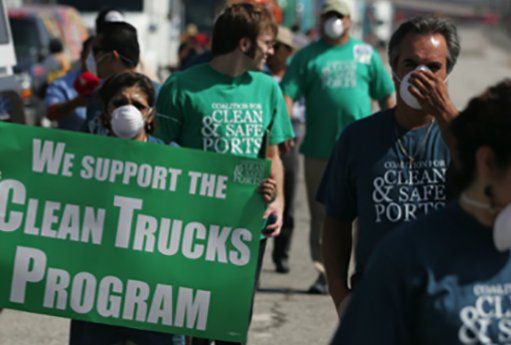Los Angeles Alliance for a New Economy-Fair Workweek
Retail Workers R LA will enable LA’s 150,000 retail workers to connect with each other across LA’s vast size, learn their rights, register to vote, and become effective, civically engaged advocates
Visit this organization’s website to learn more

4 Submitted Ideas
 CONNECT ·2018 Grants Challenge
CONNECT ·2018 Grants ChallengeRetail Workers “R” LA
The project will enable LA’s 150,000 retail workers to connect with each other across LA’s vast size, learn their rights, register to vote, and become effective, civically engaged advocates.
 CREATE ·2015 Grants Challenge
CREATE ·2015 Grants ChallengeManufacturing Opportunities for Modern Day Rosies
Rosie the Riveter illustrated how women factory workers could fill manufacturing jobs during WW II. Today women workers have few opportunities in the US transit manufacturing industry. The Modern Rosies Project aims to recruit women to factory jobs and influence manufacturers to hire women. Our travelling exhibit of modern day Rosie the Riveters raises awareness of the hardworking and capable women who are building America’s 21st century transportation and reminds people that women CAN build
 LIVE ·2014 Grants Challenge
LIVE ·2014 Grants ChallengeTurning food scraps into a resource for local farms good jobs renewable energy and zero waste.

Develop plans to expand composting in LA creating economic opportunities, reducing pollution, supporting local farms and alternative energy.
- 2013 Grants Challenge
Green Jobs in a Zero Waste LA

The Los Angeles Alliance for a New Economy proposes to partner with Isidore Electronics Recycling in a project that has the potential to generate tens of thousands of good green jobs in the City of Los Angeles by 2050 and improve the quality of thousands of existing jobs, all while contributing to a cleaner environment.
LAANE’s Don’t Waste LA project has taken the first step in this initiative by winning City Council endorsement of an exclusive franchise system for collection and diversion of waste from customers not served by the City. Currently the city of LA picks up trash at single family and small multi-family homes while private haulers receive city permits to collect waste from all other users based on service agreements with building owners and businesses.
Commercial trash accounts for over 70 percent of the city's waste but neither the city nor the private haulers are subject to any landfill diversion requirements. Private haulers are not required to recycle and the companies are not regulated. Due to this lack of regulation, recycling facilities often create major health and safety concerns for workers and nearby residents.
Most materials are collected together and then sorted by hand, sent off to the Central Valley or overseas for reuse, and not necessarily reused in the most sustainable way. Most of LA’s e-waste is shipped out of the county or the state for processing.
The policy that LAANE proposed and the Council endorsed will establish designated service zones with haulers competing for the exclusive right to service each of those areas. Successful bidders would have to adhere to strict environmental, recycling and labor standards. Recycling will be mandatory and increase exponentially, and the companies engaged in recycling will be held to new high standards. The Don’t Waste LA project aims to make LA a national model for resource management by creating a system that allows us to reach zero waste goals, while insuring that both the new jobs created as a result of recycling, and existing jobs in the industry, are good ones.
We are currently working with the City to prepare the regulations and standards for the new system. We aim for the new system and accompanying environmental review to be finalized and approved by the Council in the next year, followed by the request for proposals process and award of franchise agreements, which begins the transition to the new system. All the new contracts will not be in place and operating until 2017, but the system will begin to be implemented in 2014 as the RFP process starts and contracts are awarded.
Full implementation of the franchise and stopping the export of recycling will result in the creation of at least 14,400 new living wage jobs in processing. The franchise policy will ensure a steady stream of recyclables enabling companies like our partner Isidore Recycling to expand their business, and can lay the groundwork and provide incentives for remanufacturing locally. In addition, incentives could be built into the policy to benefit companies like Isidore. For example, in addition to educating their customers about e-waste, franchisees could be required to choose responsible subcontractors located in LA. With Isidore Recycling, we are proposing to pilot a model for how social entrepreneurs can take advantage of this new policy to expand their businesses and create good new jobs. Our proposal includes: 1) full implementation of the franchise to reach citywide zero waste, improve existing impacted jobs, create 14,400 good new processing jobs, and lay the groundwork for the creation of quality jobs in recycling and remanufacturing: 2) ensuring the franchise policy includes a goal and plan for recycling e-waste (the fastest growing waste stream in the city) in the implementation of the policy in each service zone; 3) a specific marketing plan to educate people and businesses about recycling their e-waste, and to increase e-waste recycling from 20% to 100% by 2050; 4) research on the current landscape of recycling and remanufacture in order to determine which incentives, both through this policy and otherwise, can help seed the expansion of local remanufacturing. Development of the market for recycling and remanufacture in the City will require market-based incentives and a focus on capital investments in order to bolster the infrastructure. It will also benefit from government procurement policies that are more stringent and prioritize higher percentages of recycled content, as well as a database of processors, manufacturers, and material brokers. We will need to do a study on material recovery facilities’ processing standards and the recovery rates for each material that enters a facility. The next step in the e-waste recycling industry in LA is better recovery of minerals, metals and plastics for remanufacture—another source of new green jobs.